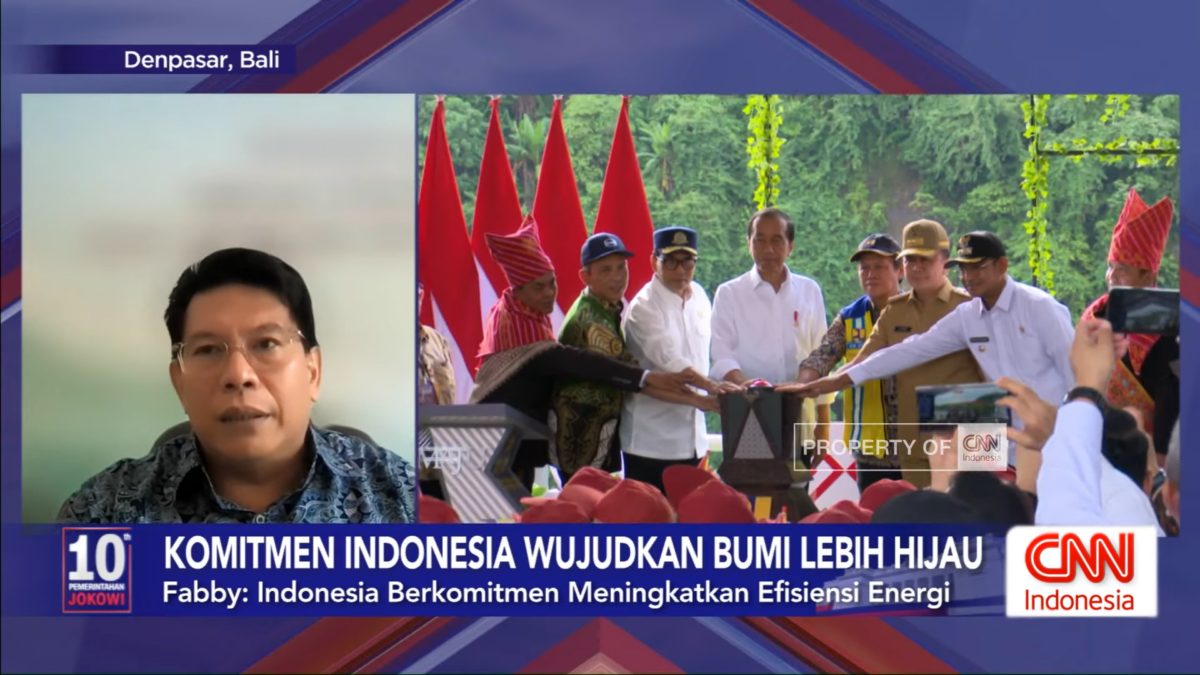Jakarta, October 21, 2024 – With Prabowo Subianto and Gibran Rakabuming Raka being sworn in as leaders of Indonesia on October 20, 2024, significant responsibilities await them, mainly to realize an emission-free Indonesia. The new government inherits the commitment built during President Joko Widodo’s 10-year administration to reduce greenhouse gas emissions and maintain environmental sustainability. This was revealed by Executive Director of the Institute for Essential Services Reform (IESR) Fabby Tumiwa in a CNN Indonesia broadcast entitled “Indonesia’s Commitment to Realizing a Greener Earth – 10 Years of Jokowi’s Administration” on Thursday (17/09/2024).
“During President Jokowi’s presidency, Indonesia has signed the 2015 Paris Agreement and committed to limiting global temperature rise to below 2 degrees Celsius, and striving to keep temperatures below 1.5 degrees Celsius. This ambitious target also includes achieving Net Zero Emissions (NZE) by 2060 or earlier. This commitment is also contained in the Nationally Determined Contribution (NDC) document as a reference in setting emission reduction targets for various sectors,” Fabby said.
However, Fabby revealed that several challenges must be overcome to achieve this target. First is the alignment of national planning with sectoral plans. Indonesia has various national development plans, such as the RPJP and RPJMN. Still, sector policies are often not synchronized, for example, in the case of mineral downstream, which does not integrate the target of building renewable energy contained in the National Energy General Plan (RUEN). As a result, the growth of coal power plants is very high compared to the development of renewable energy power plants.
“The second challenge relates to funding issues, where the need to reduce greenhouse gas emissions does require large investments. Unfortunately, the public budget allocation only covers about 20-25% of the total required. In addition, investment in renewable energy has also not reached the expected target, resulting in a lack of funds to encourage emission reduction activities in various sectors,” Fabby said.
Furthermore, Fabby said the third challenge relates to sectoral ego, where national, central, and regional interests often conflict. According to Fabby, this conflict is an evaluation and homework for the Prabowo and Gibran governments in harmonizing interests to achieve the net zero emission (NZE) target by 2060.
“To overcome these challenges, several strategic steps need to be taken. First, synchronize sectoral policies with greenhouse gas emission reduction targets. For example, the prepared national energy policy should reflect the emission targets set in the law and the long-term national development plan. Second, accelerate planning in the power sector to maximize greenhouse gas emission reductions. By increasing the renewable energy mix in this sector, especially through the role of PLN, which supplies 85 percent of national electricity, the target of reducing greenhouse gas emissions by 2030 and 2035 becomes more realistic,” Fabby explained.
Not only that, Fabby emphasized the importance of the new Government’s commitment to reflect the reduction of greenhouse gas emissions in budget priorities. The budget share for public investment in climate change mitigation and adaptation actions must be increased. At the same time, fossil energy subsidies must be reduced to support the transition to renewable energy.
“The Prabowo-Gibran administration is expected to continue the foundation that has been built by the Jokowi administration, by emphasizing the importance of investment and strong commitment in achieving NZE. The initial capital that has been prepared over the past 10 years is a strong basis for accelerating efforts to reduce greenhouse gas emissions in various sectors. In addition, success in realizing an emission-free Indonesia depends not only on national policies, but also on the active participation of the private sector and society. Synergy between government, industry, and society is needed to create a greener and more sustainable environment,” Fabby said.

